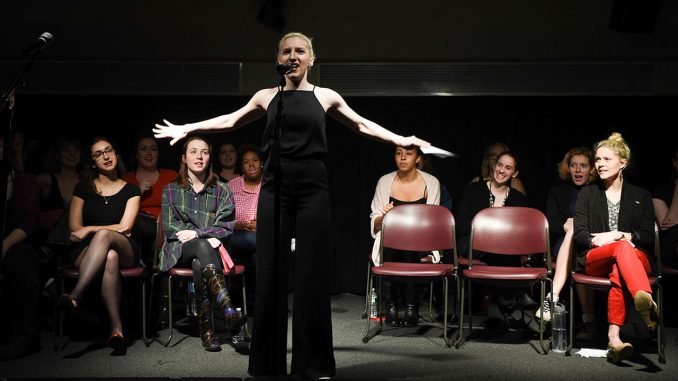
The Wellness Resource Center will not host its annual performance of “The Vagina Monologues” this month after some students said it is not inclusive.
Alison McKee, the director of the WRC, said some students gave feedback about the play, which has been performed at the university since 2003. Students were concerned that the play was not inclusive to all races, sexualities and genders.
In 1994, Eve Ensler wrote “The Vagina Monologues,” which documents more than 200 women’s experiences, thoughts and observations on sexual abuse, sexuality, violence against women and other topics. The play generally features the stories about heterosexual, cisgender women.
In 2002, Temple was selected as one of 500 schools to perform the play as an all-student benefit production. Female students were asked to audition to play one of the production’s 20 roles, The Temple News reported.
“If there were potentially people that weren’t feeling included by it, then it’s not something that fits in the WRC,” McKee said.
The WRC hosted a feedback session on the play in the fall and invited organizations that had expressed concerns in the past. They were asked to give their input on the play and whether the WRC should perform it this month.
“The WRC wants to make sure we’re doing things that are as helpful and inclusive as possible and if somebody’s saying, ‘Ouch, this hurts me,’ that’s worth us thinking about, ‘Do we still do it then right now?’” McKee added.
McKee consulted the Office of Institutional Diversity Equity Advocacy and Leadership’s Director of Student Engagement Nu’Rodney Prad on the decision to cancel “The Vagina Monologues” performance.
Prad said the play does not acknowledge or present the intersectionality of women’s issues and that the play is “heterocentric and very cisgender.”
Ensler has updated “The Vagina Monologues” in recent years with passages about female genital mutilation and transgender women.
The WRC performed this version but couldn’t guarantee it would be “comfortable and safe” for all students if continued, McKee wrote in an email. Prad said the updated version goes against the IDEAL office’s mission by making students “feel [like] they have to do something and represent a whole entire community.”
“Some of our students that may identify within the LGBTQIA community brought up concerns…that it creates this perpetual existence that people are not focusing…on trans identity as much,” Prad said.
Prad questioned the play’s portrayal of Black women’s experiences.
“There are different troubles and trials that may face white women and…Black women that may be either due to societal issues that are in place, so I don’t know if it really hits on any of that at all,” Prad added. “We should look at something that is a little bit more inclusive to people.”
Sophia Wnek, a junior public relations major and former cast member of the WRC’s “The Vagina Monologues,” said she would have been the director of this month’s production. She added that she and her castmates were surprised to find out the performance was canceled.
Although Wnek said it “breaks [her] heart” that the performance will not take place this year, she understands why it is outdated. The cast of the 2017 performance was mostly cisgender, white women, she said.
“It’s kind of an older version of feminism before this wave of intersectional feminism that is growing currently, and so I totally get that,” Wnek added. “There could be hope to bring it back if changes are made or decisions are altered.”
The WRC cannot alter the play’s monologues but applied student feedback from the fall performance to come up with an event, called LoveTU, on Thursday at 8:30 p.m. in the Student Center Underground. Although McKee said it is not meant to replace “The Vagina Monologues,” the event will focus on self-love and feature music, dance and spoken word poetry.
CORRECTION: A previous version of this story reported that the Wellness Resource Center hosted a feedback performance in the fall. It was a feedback session where students gave their responses to the play. A quotation from Sophia Wnek mischaracterized the WRC as “banning” the show, and that quotation has since been removed for accuracy.


Be the first to comment